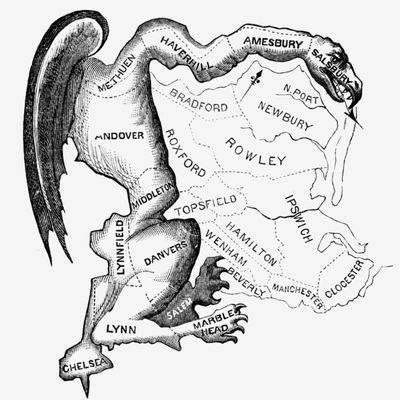
When the U.S. Supreme Court declared partisan gerrymandering none of its business in June, it did remind opponents of that nasty and anti-democratic practice there was another way to skin the cat, as I noted at the time:
The silver lining of the Supreme Court’s retreat from interest in partisan gerrymandering is that it has led the Court to defer to recent efforts to attack the practice on state constitutional grounds. That’s what happened last year when the Pennsylvania Supreme Court struck down a GOP-drafted congressional map and substituted its own: As Republicans everywhere howled, the U.S. Supreme Court shrugged and refused to review the case.
Now partisan gerrymandering has hit a judicial wall in a second state, North Carolina, as the Raleigh News & Observer reports:
North Carolina’s political maps for the state legislature are unconstitutional and must be redrawn before the 2020 elections, a court has decided.
A panel of judges struck down the maps Tuesday, in a 357-page ruling that focused on the level of political partisanship used to draw them. The maps were drawn in 2017 to replace previous maps, drawn in 2011, that had also been ruled unconstitutional. Both sets of maps were drawn by North Carolina’s Republican-led legislature.
This was the unanimous decision of a fact-finding trial court (in North Carolina, lawsuits involving constitutional challenges are generally heard by three-judge panels — in this case composed of two Democrats and one Republican), not the appeal court of final recourse, but it very thoroughly examined the redistricting system and legal precedents and, like the Pennsylvania Supreme Court, found that the GOP’s effort to systematically reduce representation of Democratic voters violated the state constitution’s equal protection clause (plus another “free elections” clause). It ordered the legislature to conduct a remap for 2020 immediately, for which it set a September 18 deadline. Amazingly, the Republican president of the North Carolina Senate said he intended to comply instead of seeking to overturn the order with an appeal to a higher state court:
[A]fter the loss Tuesday, Republican Senate leader Phil Berger said he wouldn’t appeal and would instead start drawing new maps.
“We disagree with the court’s ruling as it contradicts the Constitution and binding legal precedent, but we intend to respect the court’s decision and finally put this divisive battle behind us,” Berger said in a statement. “Nearly a decade of relentless litigation has strained the legitimacy of this state’s institutions, and the relationship between its leaders, to the breaking point. It’s time to move on.”
We’ll soon find out if other Republicans agree. In theory, the decision could provide the basis for a challenge to North Carolina’s congressional map, too, but it remains to be seen if that will develop. Nonpartisan maps should help Democrats enormously in the 2020 legislative elections, in which all 120 House seats and 50 Senate seats will be up. Currently Republicans hold a 64-55 margin in the House (with one vacancy) and a 29-21 margin in the Senate. With a gubernatorial and a Senate race on the ballot and the state also expected to be a presidential battleground, North Carolina could represent a mega-target for both parties next year.
There’s no particular reason today’s decision in one state court should have an impact on potential gerrymandering cases elsewhere. But on the other hand, copycat lawsuits are entirely likely, particularly in places with state constitutional provisions similar to the general “equal protection” guarantees found in Pennsylvania and North Carolina. You can expect some intense litigation before the next round of redistricting begins in 2021. Soon, in some states, partisan gerrymandering can be as illegal and unsavory as racial gerrymandering.






























